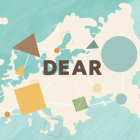Training on Trains - with a Ticket to the Future
News details
Meet Adele Zaini and Jip van Kemenade, two young climate activists from Italy and the Netherlands respectively. They were among 100 activists from Europe, Africa, Latin America, and Asia Pacific, learning together through the “Ticket to the Future”, while traveling across EU countries. Their first climate justice workshops took place on board two trains - from both Paris and Madrid - to Barcelona.
They are all participants in SPARK, the DEAR project taking action against inequalities driving climate change and injustice.
Read about their ideas and visions about utopian futures, challenges of young climate activists, the power of non-formal learning and the main hurdles to having their voice heard.
What do you see as the main barriers to youth participation in decision-making?
Jip: On the train we discussed what climate justice entails and what the most important elements are to take to policymakers.
A recurring theme was representation.
But I think you must be careful, as there is a bit of a hype to include young people right now. You need to include young people from the first discussion, you cannot have 30 sessions with all the people you already know and then have one session where you get feedback from youth.
You need to have them at the table from the beginning and ask: What do you need? You will be surprised by what they have to say.
Adele: It is so absurd to me that youth often have no space in decision-making while our voice is so strong, and we are the ones living with the consequences. The generation in power needs to realise that we are not immature, inexperienced individuals. We often have a lot of knowledge, the extra energy and commitment, and believe that change is possible. Many times, I was told I am too idealistic but only when our ambitions are this high, we will reach a point that we would have never reached otherwise.
What makes non-formal learning opportunities such as ‘Ticket to the Future’ so powerful?
Adele: Formal education is often quite passive while non-formal education is more active. It is your decision to be there and that is the gamechanger. You learn so much by moving, exchanging, doing, and living the experience. ‘Ticket to the Future’ was all about movement - being on the train meeting people from all over the world with so many different lived experiences.
You cannot get this information from the news. It is a completely different experience to see it in their eyes, hear it in their voices and feel it through their emotions.
Jip: In formal education environments there is a lot of pressure to perform, you need to prove yourself, and get good grades.
In an education system where you need to prove yourself, you often stop listening to others to prove your own point in debates. I doubt this is the best way to gain mutual understanding. Instead, in non-formal spaces such as during the ‘Ticket to the Future’ there is more room to explore someone else’s narrative and be open to different perspectives.
How can young individuals effectively educate themselves about climate crisis, and what obstacles might they encounter in this process?
Jip: Climate science is quite complicated. You need a lot of knowledge, tools, and resources. This is especially complicated for young people who are just learning about the world and trying to find their place. Finding out that so many human activities have created a climate crisis that feels unfixable can make young people feel very hopeless and sad.
I see a lot of mental health problems among young people. Many adults fear making them even more hopeless by telling the truth so they give them a positive spin on things – you can change the world if you shower less for example. But after you do this for a while, you realise that it is not effective, and you lose your drive to change.
So, I think it is very important to be gentle but honest. We need to tell the truth: these are big problems and we do not know how to solve them. At the same time, we need to make space for grieving, doing this collectively, and then afterwards moving to a space of collective action.
The activist exchange was called ‘Ticket to the Future’, so what does your utopian future look like?
Adele: In my utopian world, we would act less as individuals and more like a community. Once you start to think as a community - you share, you are generous, you take care of others and the planet - everything changes.
Jip: In my utopian future, policies would prioritise the most marginalised groups in society, because I think if you protect the most marginalised it trickles down to all layers of society. If the most marginalised are safe from climate impacts, then the whole world will be better off.
More about the EU DEAR project SPARK:
Through the SPARK consortium, 20 organisations and 100s of young people across 13 European countries mobilised public support for gender-just climate and development policies.
The interview was initially published on the European Commission pages for the European School Platform.
The “Ticket to the Future” group arriving in Barcelona, ©EU DEAR project SPARK!-ClimAct, 2023.


Log in with your EU Login account to post or comment on the platform.